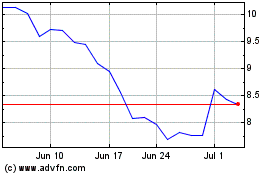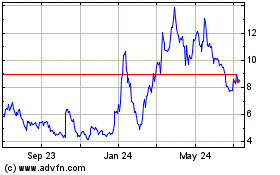By Betsy McKay and Peter Loftus
International health officials vowed after West Africa's Ebola
crisis to be better armed for the next epidemic with vaccines,
drugs and diagnostic tests.
Now the next one--Zika--is here and in an echo of Ebola,
researchers are scrambling to develop medical tools to fight the
virus.
About 15 companies are working on Zika vaccines, most in the
initial stages, according to the World Health Organization.
Among the more advanced are some in development by the U.S.
National Institute of Allergy and Infectious Diseases and Bharat
Biotech International Pvt. Ltd. in India, said Marie-Paule Kieny,
the WHO's assistant director-general for health systems and
innovation. She predicted it would take at least 18 months for
large-scale trials to get under way.
Drugmakers Sanofi SA, Inovio Pharmaceuticals Inc. and NewLink
Genetics Corp. say they are now developing Zika vaccines. The NIAID
and the Scripps Research Institute are searching for potential
drugs, while companies including Chembio Diagnostics Inc. are
working on new diagnostic tests.
In some ways, the efforts are even further behind than they were
with Ebola--for which there is still no licensed drug or vaccine.
At least a dozen Ebola vaccine and drug candidates were already in
development when the virus spread in West Africa in 2014. There
were no products in advanced development for Zika, which had been
considered a low-level threat before serious complications emerged
in the second half of last year in Brazil.
Under the best-case scenario, it will take until roughly the end
of 2017 to gather enough data from trials for regulators to make a
decision on one of NIAID's two candidate Zika vaccines, institute
director Anthony Fauci said in an interview.
Still, scientists are confident that despite the late start,
they may be able to at least shorten normal development timelines,
which can take a decade or more, by harnessing past research on
similar viruses such as dengue. Some companies and the NIAID are
trying to tweak existing designs they have already developed for
vaccines against similar viruses.
"I think we're going to see a very robust field of vaccines
coming forward," said Dr. Fauci, adding that he spoke with "at
least two major companies" on a recent weekend.
The scramble to slow the spread of Zika points to a larger
problem: Epidemics move faster than global institutions. There are
no vaccines for many of the world's largest health threats in part
because it isn't a very lucrative business. Epidemics are
unpredictable, making for an uncertain revenue stream, and often
erupt in poor parts of the world. Health officials are aware that
current research and development processes are ill-suited for
epidemic diseases and have begun working on changes in the wake of
the Ebola crisis.
Testing on the effectiveness of medical products for Ebola
didn't get under way until the epidemic was tapering off. One
vaccine, developed by Merck & Co. and NewLink, was shown to be
effective in a clinical trial. The NIAID halted a trial on a drug
called ZMapp because there weren't enough Ebola patients to
determine conclusively how well the drug worked.
Other challenges in the case of Zika include a dearth of prior
research on the mosquito-borne virus; difficulties developing drugs
to ease an infection that has short-lived symptoms; and possible
cross reactions with related viruses like dengue.
Sanofi said last month it started work on a Zika vaccine, using
20 years of expertise from developing a vaccine against dengue,
which is in the same family of viruses. "We aim to cut years off
the normal timelines," a Sanofi spokeswoman said.
The NIAID also is taking advantage of earlier research,
modifying products that already were in development, Dr. Fauci
said. It is inserting a gene for Zika virus into a vaccine
originally developed for West Nile virus, for which the institute
couldn't find a commercial partner. NIAID hopes to start human
clinical trials on the Zika vaccine candidate in September in the
U.S., Dr. Fauci said.
Inovio Pharmaceuticals hadn't done any Zika research before last
year. But after reading about the spread of Zika in South America,
Chief Executive Joseph Kim decided to try making a Zika vaccine
with the same technology it is using to develop vaccines against
other diseases, based on DNA sequences found in the targeted
viruses.
That initial, small-scale effort took on new urgency earlier
this winter after Dr. Kim started seeing photos of babies born with
microcephaly--undersized skulls and brains--which researchers have
tied to Zika infections in the mothers.
"As a father of three young kids, it definitely moved me
personally," Dr. Kim said in an interview.
The company plans to test its vaccine in monkeys infected with
Zika, and, if successful, move into human testing possibly by early
next year, he said.
Development of drugs has drawn less interest; Zika causes mostly
mild, short-lived symptoms, and 80% of those infected never develop
symptoms. The Scripps Research Institute is one of the few that is
searching for potential treatments, using a robot at a lab in
Jupiter Beach, Fla., that can perform test-tube screening of
millions of chemical compounds. Researchers inject a glowing
substance called luciferase--also found in fireflies--into modified
Zika cells to help show whether a potential drug candidate is
halting replication of the virus.
It will take at least two years to find a treatment, predicted
Michael Farzan, a professor of immunology and microbial science at
Scripps.
Researchers and companies also are working on faster and more
accurate diagnostic tests, as demand for testing grows. Current
tests are run only in advanced laboratories, and have limitations.
Tests for antibodies don't always distinguish between recent
infection with Zika and related viruses such as dengue. A second,
confirmatory test is required.
The Centers for Disease Control and Prevention said it has been
receiving hundreds of tests a day to process. It is now
distributing that test package to other qualified labs to ease the
backlog.
Chembio Diagnostic Systems Inc. is working on a portable,
rapid-results Zika test. It aims to show from a drop of blood from
a fingertip whether someone is infected, said Chief Executive John
Sperzel. He predicted the company could develop a prototype by
midyear, and then test its accuracy in the field. "We need to
quickly develop rapid, point-of-care tests that are simple,
cost-effective and portable," he said.
Write to Betsy McKay at betsy.mckay@wsj.com and Peter Loftus at
peter.loftus@wsj.com
(END) Dow Jones Newswires
March 06, 2016 19:28 ET (00:28 GMT)
Copyright (c) 2016 Dow Jones & Company, Inc.
Inovio Pharmaceuticals (NASDAQ:INO)
Historical Stock Chart
From Mar 2024 to Apr 2024

Inovio Pharmaceuticals (NASDAQ:INO)
Historical Stock Chart
From Apr 2023 to Apr 2024
